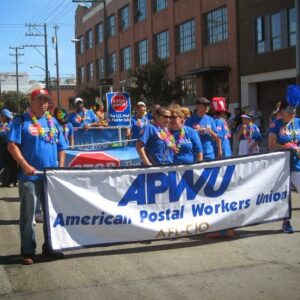March 24, 2022
What…did you not vote on the CBA?
By now the fate of the contract is decided. You either exercised the power of your membership or let it go to waste.
If you voted, thanks, because for over 180 years postal workers had very little, if any, say in their employment. The Post Office Department was all powerful. Now the PO’s power is subject not just to the law (such as it is), but also to the contract. Our years of struggle to get and pursue collective bargaining is rich with lessons learned.
Modest start & struggles
President Kennedy’s 1962 Executive Order gave us limited negotiation rights over promotions, transfers, RIFs and some working conditions. A government- imposed union election in 1962 determined postal unions recognition. It took another eight years and a nationwide wildcat strike to produce real negotiations.
The 1971 contract was negotiated (by 7 unions no less) before the law establishing USPS was signed. Nixon’s promised pay increase was blocked by his wage freeze. But the AFL-CIO’s helped force that first pay increase and APWU was born!
Real Bargaining, more struggles
Postmaster General DeJoy is not the first corporate boss we’ve negotiated with. In 1975 PMG Benjamin Franklin (kid you not) Bailar and the Unions, negotiating together, settled for a 12% pay increase with the strike fresh on everyone’s mind.
The 1978 negotiations were bitter! Management called us overpaid and underworked. Facing debt and volume de- creases, wage cuts were demanded. Negotiations stalled. no contract-no Work was the call of the day. The PMG’s threats to fire all strikers didn’t stop Bulk Centers in New Jersy & California from walking out.
A deal was struck for a 2% pay increase and capped COLA. The Rank & File Committee rejected the pact which was sent out for a vote anyway. The National Con- vention and 94,400 members voted to reject the CBA. The PMG refused to reopen negotiations ending with an arbi- trated 9% pay increase but weakened lay-off protections.
The struggles continued
In 1981, the PMG, trying to force a government election to recognize only one union, refused to negotiate. A media blitz threatened another postal strike. A deal was reached only to have the bosses re-write what had been agreed to. Eventually we went from a $1,850 pay boost to a $300 annual increase, and some “cash” payments. Even so the CBA was ratified.
In 1984, the Board of Governors openly meddled in ne- gotiations calling us overpaid. Talks stalled with bosses unilaterally imposing a 23% lower entry wage resulting in court and congressional action. The battle over postal economics resulted in an arbitrated 2.7% pay increase and lower starting pay with longer step increase periods.
Three PMGs came and went but in 1987 PMG Tish promised to negotiate an agreement resulting in a 2% pay increase, followed by $300 and $200 increases.
We’ve negotiated through wars, oil embargos, wage con- trols, the PATCO strike and other seemingly insurmount- able hysteria. We have had contract extensions, more arbitrations, and rejected CBAs.
Space doesn’t permit more history. My point is to express how much goes into getting a contract that makes your career and living standards worthwhile. Now through a worldwide pestilence altering our lives, economy, educa- tion and prices, a negotiated contract was produced and your precious right to vote on your destiny was preserved.
More Power in Your hands
Exercising your Union vote wields real power. As bro- midic as it sounds, YOU ARE THE UNION! Two upcom- ing critical events, the national convention and the national Union elections, will let you flex your union power again.
Your vote determines Convention delegates who set union policy. Your vote elects officers that administer that policy and representation. Again, destiny is in your hands. Coordinators Stone, Beasley, Foster, Jones and I urge you – DON’T WASTE YOUR POWER!


